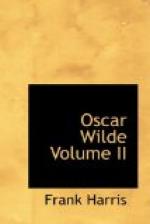[Footnote 2: I had touched on the evil side of his snobbery, I thought, by saying that it was only famous actresses and great ladies that he ever talked about, and in telling how he loved to speak of the great houses such as Clumber to which he had been invited, and by half a dozen other hints scattered through my book. I had attacked English snobbery so strenuously in my book on “The Man Shakespeare,” had resented its influence on the finest English intelligence so bitterly, that I thought if I again laid stress on it in Wilde, people would think I was crazy on the subject. But he was a snob, both by nature and training, and I understand by snob what Shaw evidently understands by it here.]
[Footnote 3: The reason that Oscar, snobbish as he was, and admirer of England and the English as he was, could not lay any solid social foundations in England was, in my opinion, his intellectual interests and his intellectual superiority to the men he met. No one with a fine mind devoted to things of the spirit is capable of laying solid social foundations in England. Shaw, too, has no solid social foundations in that country.
This passing shot at English society serves it right. Yet able men have found niches in London. Where was Oscar’s?—G.B.S.]
“Another difficulty I have already hinted at. Wilde started as an apostle of Art; and in that capacity he was a humbug. The notion that a Portora boy, passed on to T.C.D. and thence to Oxford and spending his vacations in Dublin, could without special circumstances have any genuine intimacy with music and painting, is to me ridiculous.[4] When Wilde was at Portora, I was at home in a house where important musical works, including several typical masterpieces, were being rehearsed from the point of blank amateur ignorance up to fitness for public performance. I could whistle them from the first bar to the last as a butcher’s boy whistles music hall songs, before I was twelve. The toleration of popular music—Strauss’s waltzes, for instance—was to me positively a painful acquirement, a sort of republican duty.
[Footnote 4: I had already marked it down to put in this popular edition of my book that Wilde continually pretended to a knowledge of music which he had not got. He could hardly tell one tune from another, but he loved to talk of that “scarlet thing of Dvorak,” hoping in this way to be accepted as a real critic of music, when he knew nothing about it and cared even less. His eulogies of music and painting betrayed him continually though he did not know it.]
“I was so fascinated by painting that I haunted the National Gallery, which Doyle had made perhaps the finest collection of its size in the world; and I longed for money to buy painting materials with. This afterwards saved me from starving: it was as a critic of music and painting in the World that I won through my ten years of journalism before I finished up with you on the Saturday Review. I could make deaf stockbrokers read my two pages on music, the alleged joke being that I knew nothing about it. The real joke was that I knew all about it.




